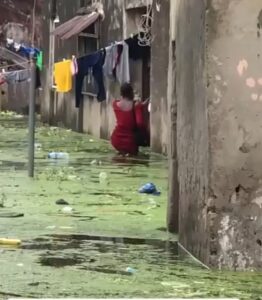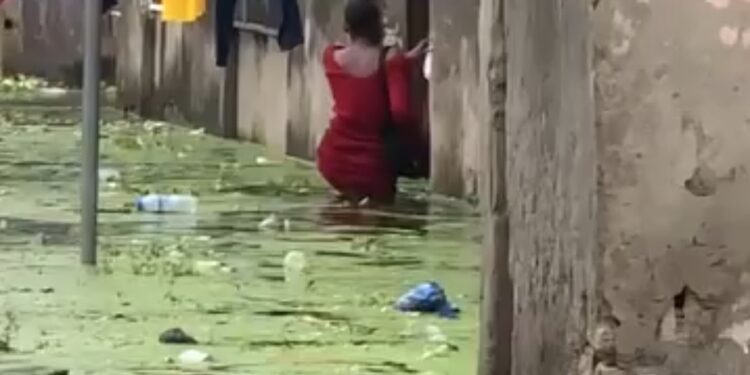
For The Merit Newspaper
LAGOS, Nigeria — Each rainy season, Lagos transforms into a maze of flooded streets and submerged neighbourhoods. Beneath the murky, brown water lies an invisible but deadly mix of sewage, industrial waste, and disease-causing microorganisms — a toxic brew that endangers millions across Africa’s most populous city.
A recent investigation by The Merit Newspaper’s Health Desk, which visited flood-prone areas including Jakande Housing Estate and surrounding communities in Lekki Phase 2, revealed severe stagnation of floodwater days after heavy rainfall. Residents said the stagnant water often emits foul odours and attracts mosquitoes, posing both environmental and health threats.
In contrast, The Merit Newspaper observed that Lekki Phase 1, equipped with a relatively functional drainage system, experiences only short-lived flooding. After a heavy downpour, water typically recedes within a day, flowing into the lagoon through interconnected drainage channels. However, in Jakande and Lekki Phase 2, where drainage infrastructure is either poorly designed or non-existent, floodwaters remain stagnant for extended periods — often seeping into homes, shops, and schools.
Environmental experts warn that this stagnation creates a perfect breeding ground for pathogens. Research published in the Journal of Water and Health (Adeleye et al., 2022) found high levels of E. coli, Salmonella, and Vibrio cholerae — bacteria responsible for cholera and typhoid — in floodwaters sampled from parts of Lagos, including Mushin, Agege, and Surulere. The study also detected heavy metals such as lead, chromium, and cadmium above the World Health Organisation’s (WHO) safe limits.
According to the Nigeria Centre for Disease Control (NCDC), Lagos recorded over 1,200 suspected cholera cases and 36 deaths between June and August 2024, the highest in the nation during that period. The agency attributed the outbreak to “exposure to contaminated water sources and poor sanitation in flood-prone areas.”
The Lagos State Environmental Protection Agency (LASEPA) has repeatedly cautioned that stagnant floodwater — often mixed with refuse and industrial effluents — harbours dangerous bacteria and mosquito larvae. In a recent statement, LASEPA reiterated that “indiscriminate waste dumping into drainage channels obstructs water flow, causing stagnation and contamination that pose serious health risks to residents.”
Residents of Jakande Housing Estate and nearby communities told The Merit Newspaper that the stagnant floodwater often persists for days, forcing them to wade through it to access transportation, workplaces, and schools. “Even when the rain stops, the water remains. It enters our homes and damages our property,” said a resident, Mrs Ronke Adeniyi, a trader who described frequent skin infections among children in the neighbourhood.
READ ALSO:Political Earthquake: Enugu’s Mbah Dumps PDP for APC
The World Health Organisation’s 2023 fact sheet on waterborne diseases states that nearly 90% of diarrheal cases worldwide are linked to unsafe water and inadequate sanitation. It further estimates that children under five are most at risk, with about 297,000 deaths annually resulting from unsafe water and poor hygiene.
Public health analysts say the situation in Lekki Phase 2 and other low-lying parts of Lagos demands urgent government intervention. “Investments in proper drainage systems, waste management, and public health education are critical to preventing future outbreaks,” noted a Lagos-based environmental health specialist, Dr Stephen James, in an interview with The Merit Newspaper.
READ ALSO:Rohr vs Nigeria: Ex-Coach Could End Super Eagles’ 2026 Dream
As climate change and rapid urbanisation intensify flooding across Lagos, the contrast between well-drained areas like Lekki Phase 1 and flood-prone communities such as Jakande Housing Estate underscores a growing environmental inequality. For now, the stagnant waters that linger in these neighbourhoods are more than a seasonal inconvenience — they are a silent public health emergency.
Sources:
Adeleye, O. et al. (2022). Bacteriological and Physicochemical Analysis of Floodwater in Lagos Metropolis. Journal of Water and Health, Vol. 20, Issue 3.
Nigeria Centre for Disease Control (2024). Weekly Epidemiological Report, Week 33 – Cholera Outbreak Update.
Lagos State Environmental Protection Agency (2024). Press Release on Floodwater Contamination in Lagos Metropolis.
World Health Organisation (2023). Water, Sanitation and Hygiene: Key Facts.

















